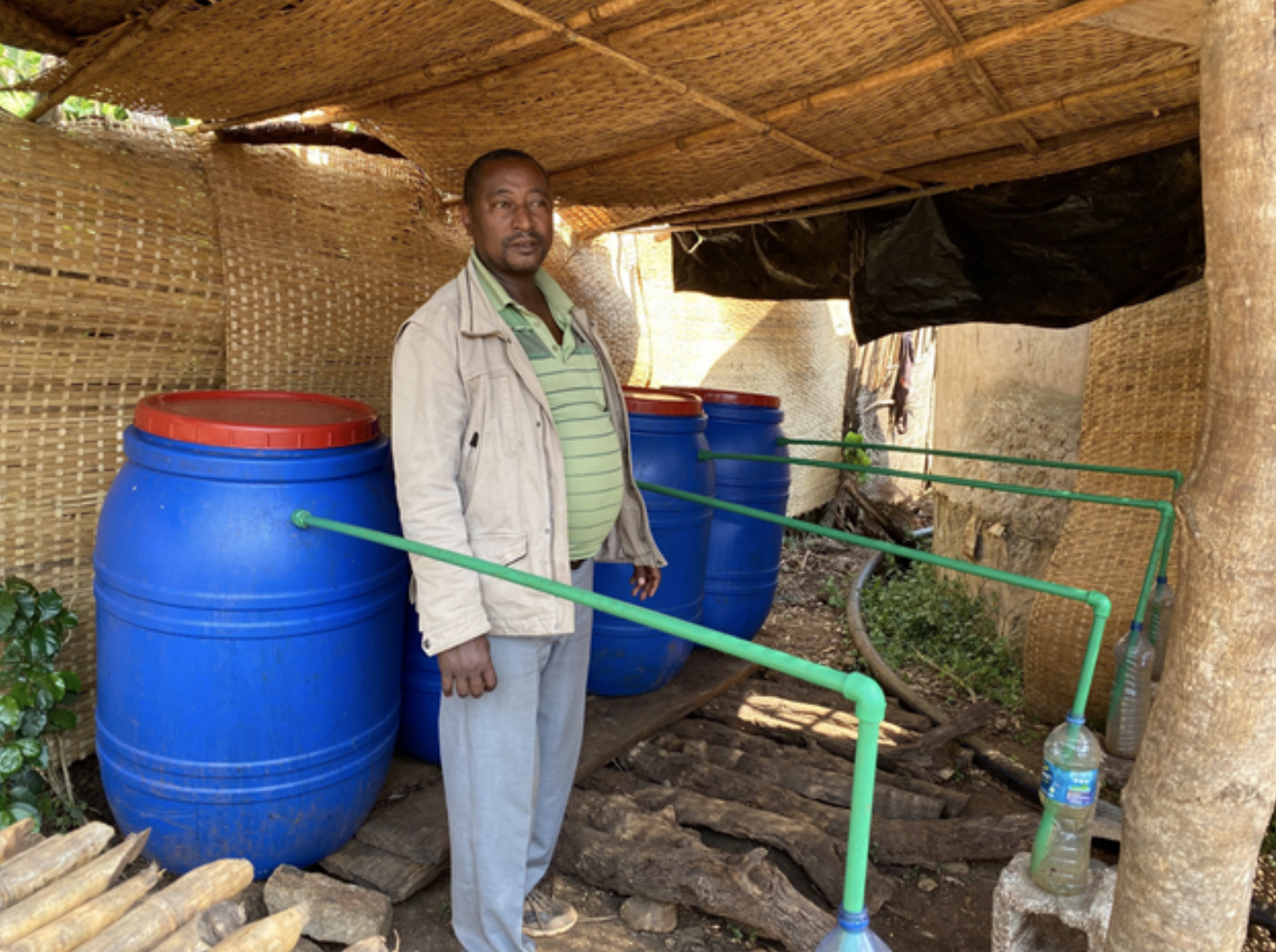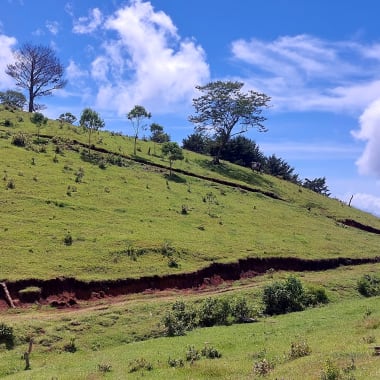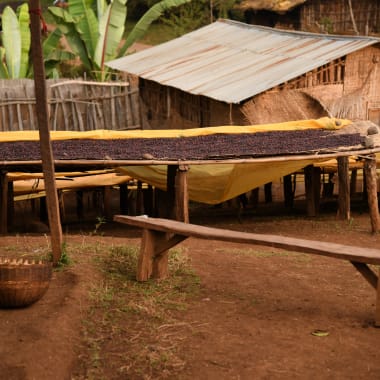-
Producer
-
Jabanto Producers
-
Country
- Ethiopia
-
Region
-
Kochere
-
Altitude
-
2000m above sea level
-
Variety
-
Process
-
Importer
-
Condesa Co.Lab
-
Body
-
Light
-
Acidity
-
Bright
-
Tasting notes
-
White peach, fresh hops, jasmine
-
Roast style
Ethiopia
Jabanto Producers
Anaerobic WashedThe Jabanto group produces different coffee types: regional lots, village level lots, single farmer lots, variety lots and processing lots. If you got to taste the carbonic maceration, you might notice this coffee has more balanced flavours and a very subtle presence, less loud and with fewer natural hints.
Jabanto Producers produced an outstanding amount of high-quality coffee lots last season. Our first VS showcased a beautiful carbonic maceration, and for the third delivery, we come back to them with an extremely well-executed anaerobic process.
VERY SPECIAL
The first qualities we look for in our VS coffees are a clean profile and a delicious flavour—this lot ticks those two boxes.
The high level of care during harvest and processing has translated into the final product’s taste, and inevitably its size and price. This anaerobic fermentation lot is the smallest and of all Jabanto’s offerings and comes at a price over the average of what we would pay for our every day single origins.
ANAEROBIC FERMENTATION VS. CARBONIC MACERATION
The anaerobic process has gained more and more popularity during the last few years, but the truth is that it’s not a new technique. According to Cafe Imports, “This isn’t so much brand-new style of processing as it is an expansion of some principles related to the natural activity that takes place in every existing process”.
Anaerobic means “without oxygen”. In coffee, this type of fermentation usually refers to a process occurring in a sealed environment (a tank) and involves reduced participation of microbes. However, anaerobic is a somewhat inaccurate term as, naturally, there is always oxygen in the environment when getting sealed. A more correct definition would be oxygen-poor fermentation—now the challenge lies in correcting a whole industry.
You may have noticed that there are similarities to the carbonic maceration process. The fundamental difference lies in the cherries; in a carbonic maceration process these are placed intact; in an anaerobic fermentation process, these are pulped before being placed in the tank. Intact cherries facilitate a CO2-rich atmosphere and the participation of microbes (maceration), hence the terms carbonic + maceration.
“In the carbonic method for coffee fermentation, first, the coffee cherries are siphoned to remove low-density "floaters,” then added to an airtight tank with a one-way valve, much in the same way as in the anaerobic method. Because the skins of the cherries are left intact, fermentation may take days or weeks. The varying levels of pressure in the tank create different available sugars and pectins for the microbes to macerate. Near the bottom of the tank, the coffees are gently pressed over time by gravity, whereas cherries near the top of the pile remain unpressed and fermentation will occur slowly and almost entirely inside the skin of the fruit.“ Source: dailycoffeenews.com
 Fermentation tanks at Jabanto
Fermentation tanks at Jabanto
ABOUT THIS LOT OF JABANTO ANAEROBIC
For this particular lot, the Jabanto producers placed the Ethiopian Heirloom pulped cherries (and their mucilage) in an airtight container for 60 hours.
As with the carbonic maceration, a valve on the side of a container connected to a thin hose (tube) helps to remove carbon dioxide. The other end of the hose is inserted in a water bottle to protect the diffusion of atmospheric oxygen into the sealed tank.
When the fermentation process is finished, the beans are dried under the sun for 6-8 days until their moisture level reaches 10.5%.
WHAT’S THE IMPACT ON THE FLAVOUR?
This coffee has balanced flavours and a subtle demeanour. Compared to the Jabanto carbonic maceration (which featured the exact same bean terroir and varietal), it is less loud and boozy.
The lower development or presence of sugars during the fermentation stage allowed for the intrinsic bean properties to come out, instead of bringing up crazy flavours that are closer to a natural process coffee.
BREW, SHARE AND ENJOY
Now you know a bit more about the background it’s time to enjoy this awesome coffee! If you don’t know where to start, you can use Reuben’s brewing recipe (coming soon, see below).
You can also try your favourite method and play around with some settings to get the best of it. Don’t forget to tell us how it went, adding your recipe here, via email or on Instagram at @samplecoffee.
We look forward to hearing about your experience with this VS coffee!
FURTHER READS
Guide to anaerobic fermentation (mtpak.coffee)
Learn everything about this coffee:
Ethical, traceable sourcing
This page has all the sourcing information (variety, process, region, story, importer, and more) that our importers share with us, and give us permission to use.
The transparency helps us talk confidently about the quality and background of our product, and it helps you know exactly what you’re buying.
Learn more:
Coffee page transparency legend
Our coffee philosophy
Our business approach
Fresh harvest coffee
We only source and roast coffee from each country’s latest harvest season (so the green coffee is never older than 1 year from the time of picking, processing and packing). This ensures the sensory qualities are always at their peak and unaffected by excessive ageing.
Roasted for espresso and filter (best enjoyed black)
Roast style: omni. Omni roasts are designed to brew and taste great both as espresso and filter. Our omni single origins generally sit on Agtron values in the ~70-60 value range. So, technically, they are somewhere in the lighter side of the medium spectrum.
Designed for espresso and filter brewing. Best enjoyed black.
Learn more:
Our Loring Kestrel S35 roaster
Our roasting style and approach
Best brewed within days 15-49 post-roast
The ‘fresh is best’ saying doesn’t apply to coffee (contrary to popular belief). Waiting before opening and brewing your bag of whole coffee beans helps develop peak flavour and acidity.
But heads up: if you buy pre-ground coffee, brew it as soon as possible.
Learn more:
Our recommended brewing window
Try our custom brewing recipes
Our recipes and ratios are tailored to our coffee sourcing and roasting styles, bringing the best flavour and feel out of each coffee.
For pour over, immersion, and other filter brewing styles, check our brew guides.
For our espresso single origins, we recommend a coffee:yield ratio of 1:3:
- Dose: 20g ground coffee
- Yield: 60g espresso
- Total brew time: ~24-28 seconds
This is just a starting point! We encourage you to experiment, taste, and adjust to find the recipe that you enjoy the most.
Learn more:
Our espresso brew guide (single origin)
Brewing ratio calculator
Packaging and sustainability
- Bags: ABA-certified home compostable (AS 5810-2010)
- Labels: recyclable
- Valves (only on +250g bags): general waste
- Box and tape (online orders): recyclable
Learn more:
Our packaging
Variety
Ethiopian Heirloom variety
Heirloom (or sometimes Landrace) is an umbrella term that refers to all the coffee varietals endemic to Ethiopia.
The location
Coffee from Ethiopia
Seen as the birthplace of domesticated coffee, there are not many more exciting times at the Sample warehouse as when our fresh Ethiopian lots arrive. Legend says it’s our favourite origin…
Farm processes
Anaerobic Washed process
Machines are used to remove the flesh from the coffee cherry before being fermented in water, washed again, and finally sun dried. This process tends to result in more distinct, cleaner flavours.

Subscribe to a world of coffee
Discover a new single origin coffee from Sample every 1-5 weeks with no delivery fees.
No up-front purchase, and you can pause, cancel, or change plans at any time.
Available to order online this week:

Mexico Isavel Lopez Pablo
Flavours of blueberry, dried cranberry, white peach, nectarine
Body Acidity
Washed Typica
April 2025 harvest
Roasted omni for filter and espresso
Mexico Isavel Lopez Pablo online
Ethiopia Tadese Teko
Flavours of bergamot, mandarin, mango
Body Acidity
Washed Ethiopian Heirloom
January 2025 harvest
Roasted omni for filter and espresso
Ethiopia Tadese Teko online
Colombia Rigoberto Chavarro
Flavours of brown sugar, wine gum, candied stone fruit
Body Acidity
Washed Pink Bourbon
February 2025 harvest
Roasted omni for filter and espresso
Colombia Rigoberto Chavarro online
El Salvador Manuel Castañeda
Flavours of toffee apple, cranberry, dulce de leche
Body Acidity
Honey Pacamara
March 2025 harvest
Roasted omni for filter and espresso
El Salvador Manuel Castañeda online